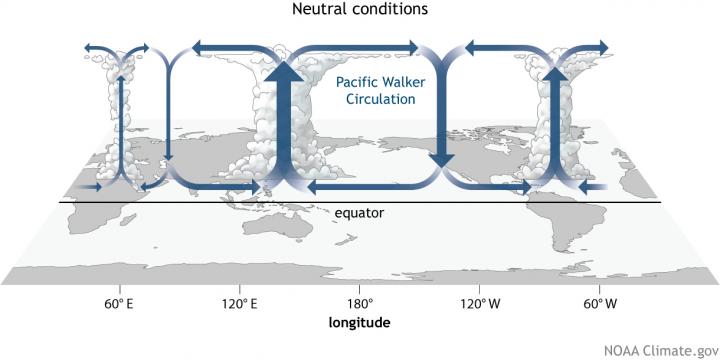Study of cloud cover in tropical Pacific reveals future climate changes

Walker Circulation is illustrated. Credit: NOAA Climate.gov
A new analysis using changes in cloud cover over the tropical Indo-Pacific Ocean showed that a weakening of a major atmospheric circulation system over the last century is due, in part, to increased greenhouse gas emissions.
The findings from researchers at the University of Miami (UM) Rosenstiel School of Marine and Atmospheric Science provide new evidence that climate change in the tropical Pacific will result in changes in rainfall patterns in the region and amplify warming near the equator in the future.
“Our findings show that an increasing concentration of greenhouse gases leads to significant changes in atmospheric circulation and tropical rainfall patterns,” said Katinka Bellomo, an alumna of the UM Rosenstiel School. “This study demonstrates that we can predict these changes in the Walker circulation from changes in cloud cover.”
The UM Rosenstiel School researchers used historical observations of cloud cover as a proxy for wind velocity in climate models to analyze the Walker circulation, the atmospheric air flow and heat distribution in the tropic Pacific region that affects patterns of tropical rainfall.
Their findings revealed a weakening and eastward shift of the Walker circulation over the last century due to greenhouse gas emissions. The analysis showed that changes in cloud cover can serve as a proxy in climate models for wind velocity in the atmosphere, which cannot be directly measured.
“This study makes innovative use of a decades old-dataset,” said Amy Clement, professor of atmospheric science at the UM Rosenstiel School. “It is impressive that visual observations from the decks of ships transiting the Pacific Ocean over a half-century can tell us something so fundamental about climate change.”
This new information can be incorporated into current climate models to predict future changes in the magnitude and pattern of the Walker Circulation due to increased greenhouse gas emissions. The study suggests that rainfall will decrease over Indonesia and in the western Pacific and increase over the central Pacific Ocean.
###
The study, titled “Evidence for weakening of the Walker circulation from cloud observations,” was published in the journal Geophysical Research Letters. The study's authors include: Katinka Bellomo and Amy C. Clement of the UM Rosenstiel School. The work was supported by grants from National Science Foundation Climate and Large Scaled Dynamics, National Oceanic and Atmospheric Administration's Climate Program Office, grant # NA10OAR4310204 and Department of Energy Biological and Environmental Research, grant #DESC0004897. The publication can be accessed here: http://onlinelibrary.
About the University of Miami's Rosenstiel School
The University of Miami is one of the largest private research institutions in the southeastern United States. The University's mission is to provide quality education, attract and retain outstanding students, support the faculty and their research, and build an endowment for University initiatives. Founded in the 1940's, the Rosenstiel School of Marine & Atmospheric Science has grown into one of the world's premier marine and atmospheric research institutions. Offering dynamic interdisciplinary academics, the Rosenstiel School is dedicated to helping communities to better understand the planet, participating in the establishment of environmental policies, and aiding in the improvement of society and quality of life. For more information, visit: http://www.
Media Contact
All latest news from the category: Earth Sciences
Earth Sciences (also referred to as Geosciences), which deals with basic issues surrounding our planet, plays a vital role in the area of energy and raw materials supply.
Earth Sciences comprises subjects such as geology, geography, geological informatics, paleontology, mineralogy, petrography, crystallography, geophysics, geodesy, glaciology, cartography, photogrammetry, meteorology and seismology, early-warning systems, earthquake research and polar research.
Newest articles

First-of-its-kind study uses remote sensing to monitor plastic debris in rivers and lakes
Remote sensing creates a cost-effective solution to monitoring plastic pollution. A first-of-its-kind study from researchers at the University of Minnesota Twin Cities shows how remote sensing can help monitor and…

Laser-based artificial neuron mimics nerve cell functions at lightning speed
With a processing speed a billion times faster than nature, chip-based laser neuron could help advance AI tasks such as pattern recognition and sequence prediction. Researchers have developed a laser-based…

Optimising the processing of plastic waste
Just one look in the yellow bin reveals a colourful jumble of different types of plastic. However, the purer and more uniform plastic waste is, the easier it is to…



